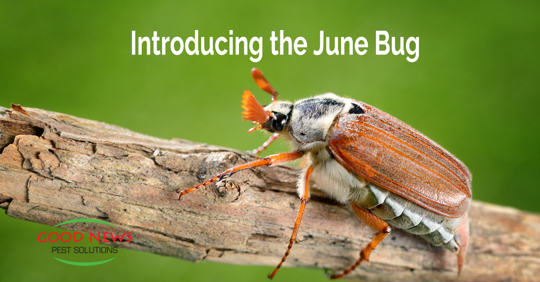April showers bring May flowers… and June bugs??
It’s not uncommon for us to be cooking out or relaxing on the porch when a hard shelled beetle thwacks into us. Most of us have had the experience of walking out of the house and feeling crunching underfoot. Then looking down to see dozens of these same beetles drawn in by our porch lights and now dead.
While there are several dozen insects that get lumped into the common June Bug basket, the most common of these nuisances are Phyllophaga longispina – a beetle that’s actually closely related to the scarabs that haunt old Egyptian tombs in all those Mummy movies.
Thankfully, this variation doesn’t devour flesh – they’re just annoying at this point. The real issue with June beetles is what they leave behind as you’re sweeping them up every morning.
A Grub By Any Other Name
Sure, the adult beetles will munch on some leaves and stems and occasionally ring the death knell for a shrubbery or two. But their real crime is of the juvenile nature.
Adult June Bugs lay somewhere between 75 and 100 eggs underground during this time of year. Those eggs hatch in two to three weeks and start eating. The larvae look like tiny legged grubs – also sometimes called white grubs. You may not spot them because they usually stay underground. But what they’re eating is the roots of whatever they can get to.
Depending on the species of June Beetle larvae, they can linger from one to three years, chomping on the roots of your grass, shrubs, and even some trees. This eventually kills the plants they’re snacking on. In fact, one of the clear signs you have a problem are big patches of brown dead grass in your yard.
The grubs can also attract pests of another kind. Moles, skunks, raccoons, and possums will often invade your space, digging tiny holes in your yard to get to the ‘slimy, yet satisfying’ treats.
To confirm you have a problem, you can do the same thing. Dig up tiny areas of sod and look for the caterpillar-like grubs that will curl into a C shape when bothered.
Soil Solutions
The most effective solutions for the grubs is to trap and remove the adults before they can reproduce. The more bird-friendly you can make your landscape, the easier it is to control the adult beetles. But if you’d like to hedge your bets, your local gardening store or nursery can help you with a couple of organic options:
Milky Spores are bacteria you mix with water or fertilizer and apply with a sprayer system. They activate in the beetles stomach to eliminate the problem. They work best in warmer, damper soil, so they’re a great option for our Gulf Coast of Florida.
Nematodes are microscopic soil worms – they feed on the grubs, eliminating the problem. They can also be applied with a sprayer, but particularly need wet ground. So, apply either right before or after running your sprinklers. That way, they soak deep into the soil.
The above solutions are not instantaneous. They can take anywhere from a couple months to several years to fully control the issue. But it is controllable.
If you use a landscaper or lawn service they may offer other solutions. Here at Good News Pest Solutions, we try to always avoid harsh chemical insecticides that can cause problems for pets and family.
For all the other creepy crawlies you may encounter in our Florida weather, we do have a solution. Go Green Perimeter Plus keeps those bugs out of your home year-round. For more information, or to schedule your first appointment, just give us a call!

